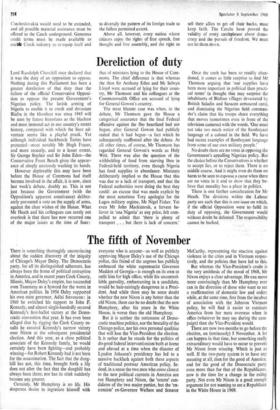The fifth of November
There is something thoroughly unconvincing abOut the sudden discovery of the iniquity of Chicago's Mayor Daley. The Democratic party, for all its distinguished adherents, has always been the home of political corruption hi America, and in recent years Cook County, Illinois, Mayor Daley's empire, has succeeded even Tammany as a byword for the worst in American politics. In 1956 Daley supported his own state governor, Adlai Stevenson : in 1960 he switched his support to John F. Kennedy, and almost single-handedly secured Kennedy's first-ballot victory at the Demo- cratic convention that year. It has even been alleged that by rigging the Cook County re- sults he ensured Kennedy's narrow victory over Nixon at the subsequent presidential election. And this year, as a close political associate of the Kennedy family, he would certainly have been fighting—and probably winning—for Robert Kennedy had it not been for the assassination. The fact that the dung- hill has not, this time, brought forth a lily does not alter the fact that the dunghill has always been there; nor has its stink suddenly become any greater.
Certainly, Mr Humphrey is no lily. His desperate desire to ingratiate himself with everyone who is anyone—as well as publicly approving Mayor Daley's use of the Chicago police, this friend of the negroes has publicly embraced the white supremacist Governor Maddox of Georgia—is enough on its own to unfit him for high office; while his uncontrol- lable garrulity, embarrassing in a candidate, would be hair-raisingly dangerous in a Presi- dent. And while there may be some doubt whether the new Nixon is any better than the old Nixon, there can be no doubt that the new Humphrey, after his years in the White House, is worse than the old Humphrey.
But it is neither the rottenness of Demo- cratic machine politics, nor the brutality of the Chicago police, nor his own personal qualities that will lose the Vice-President the election. It is rather that he stands for the politics of do-good federal interventionism both at home and abroad at a time when the disaster of Lyndon Johnson's presidency has led to a massive backlash against both these aspects of traditional postWar American policy. In- deed, in a sense the two men who come closest to the new political currents in America are not Humphrey and Nixon, the 'centre can- didates of the two major parties, but the 'ex- tremists' ex-Governor Wallace and Senator McCarthy, representing the reaction against violence in the cities and in Vietnam respec- tively, and the policies that have led to this.
But whereas the Vice-President's credo is the very antithesis of the mood of 1968, Mr Nixon enjoys a clear advantage. He can move more convincingly than Mr Humphrey ever can in the direction of those who want to see a reaffirmation of domestic-law and order; while, at the same time, free from the incubus of association with the. Johnson Vietnam policy, he will find it easier to extricate America from her mess overseas when in office (whatever he may say during the cam- paign) than the Vice-President would.
There are now two months to go before the election, on (ominously) 5 November. A lot can happen in that time, but something really extraordinary would have to occur to prevent Mr Nixon from winning. Which is just as well. If the two-party system is to have any meaning at all, then for the good of America, and for the good of the Democratic party even more than for that of the Republicans, now is the time for a change in the ruling party. Not even Mr Nixon is a good enough argument for not wanting to see a Republican in the White House in 1969.






































 Previous page
Previous page